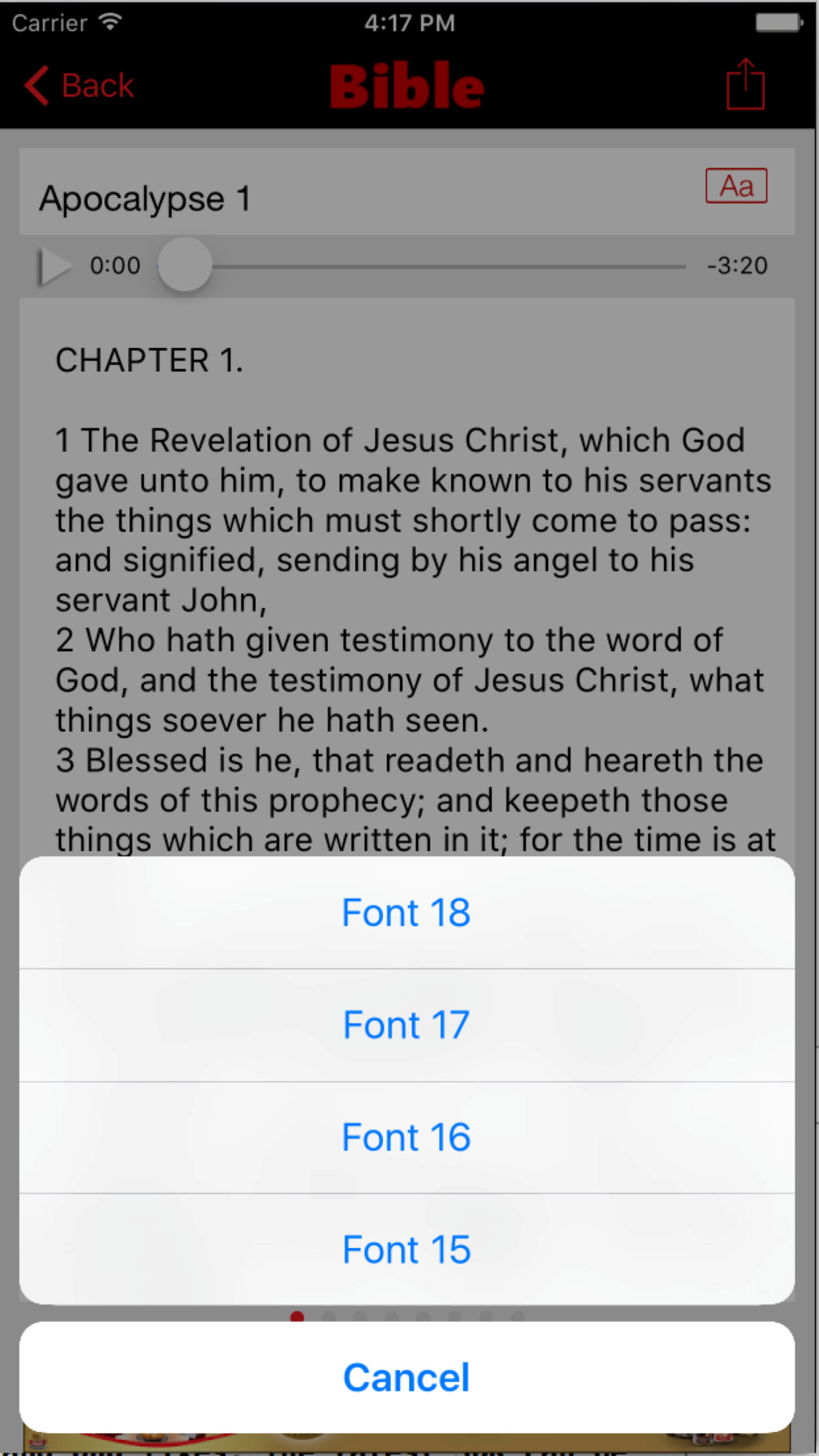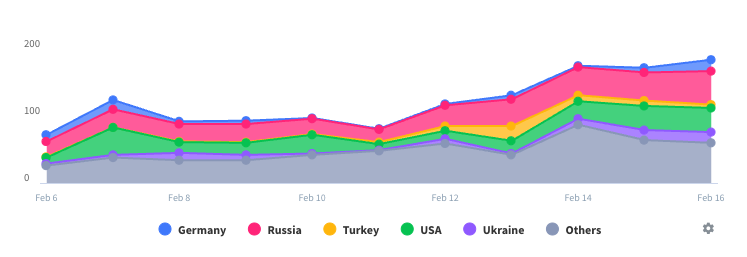

Douay Rheims Challoner Bible (Audio)
Veröffentlicht von:
siriwit nambutdee
Beschreibung
Bible DRC (Audio)
The holy bible with audio Douay-Rheims Challoner Revision (DRC). It's free.
This simple and user friendly app is an easier way to feel God’s word in your heart and to feel heaven closer to you and your loved ones. Carry your Bible anytime and anywhere you go, and read your Bible app wherever and whenever you want enlighten your mind.
FEATURES
Simple format and easy to read;
Audio bible, Listen an audio clip.
Search function
Share to social media like facebook and email.
It's Free.
Version Information
The Douay–Rheims Bible (also known as the Rheims–Douai Bible or Douai Bible, and abbreviated as D–R and DV) is a translation of the Bible from the Latin Vulgate into English made by members of the English College, Douai, in the service of the Catholic Church. The New Testamentportion was published in Reims, France, in 1582, in one volume with extensive commentary and notes. The Old Testament portion was published in two volumes thirty years later by the University of Douai. The first volume, covering Genesis through Job, was published in 1609; the second, covering Psalms to 2 Machabees plus theapocrypha of the Vulgate was published in 1610. Marginal notes took up the bulk of the volumes and had a strong polemical and patristic character. They offered insights on issues of translation, and on the Hebrew and Greek source texts of the Vulgate.
The purpose of the version, both the text and notes, was to uphold Catholic tradition in the face of the Protestant Reformation which up till then had overwhelmingly dominated Elizabethan religion and academic debate. As such it was an impressive effort by English Catholics to support the Counter-Reformation. The New Testament was reprinted in 1600, 1621 and 1633. The Old Testament volumes were reprinted in 1635 but neither thereafter for another hundred years. In 1589, William Fulkecollated the complete Rheims text and notes in parallel columns with those of the Bishops' Bible. This work sold widely in England, being re-issued in three further editions to 1633. It was predominantly through Fulke's editions that the Rheims New Testament came to exercise a significant influence on the development of 17th century English.
Much of the text of the 1582/1610 bible employed a densely latinate vocabulary, to the extent of being in places unreadable. Consequently, this translation was replaced by a revision undertaken by bishop Richard Challoner; the New Testament in three editions 1749, 1750, and 1752; the Old Testament (minus the Vulgate deuterocanonical), in 1750. Although retaining the title Douay–Rheims Bible, the Challoner revision was a new version, tending to take as its base text the King James Bible rigorously checked and extensively adjusted for improved readability and consistency with the Clementine edition of the Vulgate. Subsequent editions of the Challoner revision, of which there have been very many, reproduce his Old Testament of 1750 with very few changes. Challoner's New Testament was, however, extensively revised by Bernard MacMahon in a series of Dublin editions from 1783 to 1810. These Dublin versions are the source of some Challoner bibles printed in the United States in the 19th century. Subsequent editions of the Challoner Bible printed in England most often follow Challoner's earlier New Testament texts of 1749 and 1750, as do most 20th-century printings and on-line versions of the Douay–Rheims bible circulating on the internet.
Although the Jerusalem Bible, New American Bible Revised Edition, Revised Standard Version Catholic Edition, and New Revised Standard Version Catholic Edition are the most commonly used in English-speaking Catholic churches, the Challoner revision of the Douay–Rheims is still often the Bible of choice of more traditional English-speaking Catholics.
Ausblenden
Mehr anzeigen...
The holy bible with audio Douay-Rheims Challoner Revision (DRC). It's free.
This simple and user friendly app is an easier way to feel God’s word in your heart and to feel heaven closer to you and your loved ones. Carry your Bible anytime and anywhere you go, and read your Bible app wherever and whenever you want enlighten your mind.
FEATURES
Simple format and easy to read;
Audio bible, Listen an audio clip.
Search function
Share to social media like facebook and email.
It's Free.
Version Information
The Douay–Rheims Bible (also known as the Rheims–Douai Bible or Douai Bible, and abbreviated as D–R and DV) is a translation of the Bible from the Latin Vulgate into English made by members of the English College, Douai, in the service of the Catholic Church. The New Testamentportion was published in Reims, France, in 1582, in one volume with extensive commentary and notes. The Old Testament portion was published in two volumes thirty years later by the University of Douai. The first volume, covering Genesis through Job, was published in 1609; the second, covering Psalms to 2 Machabees plus theapocrypha of the Vulgate was published in 1610. Marginal notes took up the bulk of the volumes and had a strong polemical and patristic character. They offered insights on issues of translation, and on the Hebrew and Greek source texts of the Vulgate.
The purpose of the version, both the text and notes, was to uphold Catholic tradition in the face of the Protestant Reformation which up till then had overwhelmingly dominated Elizabethan religion and academic debate. As such it was an impressive effort by English Catholics to support the Counter-Reformation. The New Testament was reprinted in 1600, 1621 and 1633. The Old Testament volumes were reprinted in 1635 but neither thereafter for another hundred years. In 1589, William Fulkecollated the complete Rheims text and notes in parallel columns with those of the Bishops' Bible. This work sold widely in England, being re-issued in three further editions to 1633. It was predominantly through Fulke's editions that the Rheims New Testament came to exercise a significant influence on the development of 17th century English.
Much of the text of the 1582/1610 bible employed a densely latinate vocabulary, to the extent of being in places unreadable. Consequently, this translation was replaced by a revision undertaken by bishop Richard Challoner; the New Testament in three editions 1749, 1750, and 1752; the Old Testament (minus the Vulgate deuterocanonical), in 1750. Although retaining the title Douay–Rheims Bible, the Challoner revision was a new version, tending to take as its base text the King James Bible rigorously checked and extensively adjusted for improved readability and consistency with the Clementine edition of the Vulgate. Subsequent editions of the Challoner revision, of which there have been very many, reproduce his Old Testament of 1750 with very few changes. Challoner's New Testament was, however, extensively revised by Bernard MacMahon in a series of Dublin editions from 1783 to 1810. These Dublin versions are the source of some Challoner bibles printed in the United States in the 19th century. Subsequent editions of the Challoner Bible printed in England most often follow Challoner's earlier New Testament texts of 1749 and 1750, as do most 20th-century printings and on-line versions of the Douay–Rheims bible circulating on the internet.
Although the Jerusalem Bible, New American Bible Revised Edition, Revised Standard Version Catholic Edition, and New Revised Standard Version Catholic Edition are the most commonly used in English-speaking Catholic churches, the Challoner revision of the Douay–Rheims is still often the Bible of choice of more traditional English-speaking Catholics.
Screenshots
Douay Rheims Challoner Bible (Audio) Häufige Fragen
-
Ist Douay Rheims Challoner Bible (Audio) kostenlos?
Ja, Douay Rheims Challoner Bible (Audio) ist komplett kostenlos und enthält keine In-App-Käufe oder Abonnements.
-
Ist Douay Rheims Challoner Bible (Audio) seriös?
Nicht genügend Bewertungen, um eine zuverlässige Einschätzung vorzunehmen. Die App benötigt mehr Nutzerfeedback.
Danke für die Stimme -
Wie viel kostet Douay Rheims Challoner Bible (Audio)?
Douay Rheims Challoner Bible (Audio) ist kostenlos.
-
Wie hoch ist der Umsatz von Douay Rheims Challoner Bible (Audio)?
Um geschätzte Einnahmen der Douay Rheims Challoner Bible (Audio)-App und weitere AppStore-Einblicke zu erhalten, können Sie sich bei der AppTail Mobile Analytics Platform anmelden.

Benutzerbewertung
Die App ist in Tschechien noch nicht bewertet.

Bewertungsverlauf
Douay Rheims Challoner Bible (Audio) Bewertungen
Keine Bewertungen in Tschechien
Die App hat noch keine Bewertungen in Tschechien.
Store-Rankings

Ranking-Verlauf
App-Ranking-Verlauf noch nicht verfügbar

Kategorien-Rankings
App ist noch nicht gerankt
Douay Rheims Challoner Bible (Audio) Installationen
Letzte 30 TageDouay Rheims Challoner Bible (Audio) Umsatz
Letzte 30 TageDouay Rheims Challoner Bible (Audio) Einnahmen und Downloads
Gewinnen Sie wertvolle Einblicke in die Leistung von Douay Rheims Challoner Bible (Audio) mit unserer Analytik.
Melden Sie sich jetzt an, um Zugriff auf Downloads, Einnahmen und mehr zu erhalten.
Melden Sie sich jetzt an, um Zugriff auf Downloads, Einnahmen und mehr zu erhalten.
App-Informationen
- Kategorie
- Books
- Herausgeber
- siriwit nambutdee
- Sprachen
- English
- Letzte Veröffentlichung
- 1.0.1 (vor 8 Jahren )
- Veröffentlicht am
- Sep 24, 2016 (vor 8 Jahren )
- Auch verfügbar in
- Vereinigte Staaten, Malaysia, Polen, Indien, Italien, Japan, Südkorea, Kuwait, Kasachstan, Libanon, Nigeria, Niederlande, Neuseeland, Philippinen, Pakistan, Israel, Portugal, Rumänien, Russland, Saudi-Arabien, Schweden, Singapur, Thailand, Türkei, Taiwan, Ukraine, Südafrika, Dänemark, Österreich, Australien, Aserbaidschan, Belgien, Brasilien, Belarus, Kanada, Schweiz, China, Kolumbien, Tschechien, Deutschland, Vereinigte Arabische Emirate, Dominikanische Republik, Algerien, Ecuador, Ägypten, Spanien, Finnland, Frankreich, Griechenland, Sonderverwaltungsregion Hongkong, Ungarn, Indonesien, Irland
- Zuletzt aktualisiert
- vor 2 Wochen
This page includes copyrighted content from third parties, shared solely for commentary and research in accordance with fair use under applicable copyright laws. All trademarks, including product, service, and company names or logos, remain the property of their respective owners. Their use here falls under nominative fair use as outlined by trademark laws and does not suggest any affiliation with or endorsement by the trademark holders.
- © 2025 AppTail.
- Unterstützung
- Privacy
- Terms
- All Apps





